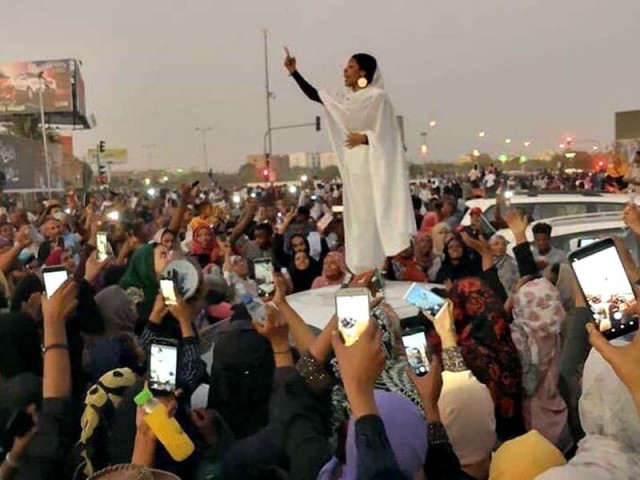Meet Alaa Salah, Sudan's singing protester
22-year-old's image symbolised the protest movement against Omar Bashir

Salah said she was happy that the image, taken on April 8 at a demonstration in the Sudanese capital, had been viewed so widely.
“I’m very glad that my photo let people around the world know about the revolution in Sudan … Since the beginning of the uprising I have been going out every day and participating in the demonstrations because my parents raised me to love our home,” she told The Guardian on Wednesday, a day before Sudan's military ousted and arrested President Omar Bashir.
In an address on state television, Defence Minister Awad Mohamed Ahmed Ibn Auf said Bashir, 75, was under arrest in a “safe place” and a military council was now running the country.
Sudan's Omar al-Bashir in key dates
The protests against the 30-year rule of Bashir began in December last year, but had intensified at the weekend when huge crowds gathered at a crossroads in front of a heavily guarded military complex in the Sudan capital.
Salah said she does not come from a political background, and took to the streets to fight for a better Sudan. “Our country is above any political parties and any sectarian divisions,” she said.
“The day they took the photo, I went to 10 different gatherings and read a revolutionary poem. It makes people very enthusiastic. In the beginning I found a group of about six women and I started singing, and they started singing with me, then the gathering became really big.
“I have practiced presenting at the university; I don’t have an issue with speaking in front of people and at big gatherings.”
A line in the poem she read - “The bullet doesn’t kill. What kills is the silence of people” – is popular with protesters, and was chanted by demonstrators in January 2018 and during unrest in September 2013.
Salah’s mother is a fashion designer working with the traditional Sudanese toub – the dress she was wearing in the photographs – and her father owns a construction company.
The garment has become a symbol of the female protesters, and Salah said she had narrowly escaped arrest when she wore the toub at an earlier demonstration.
“The toub has a kind of power and it reminds us of the Kandakas,” Salah said.
Kandakas were queens of the Nubian kingdom of Kush, which ruled much of what is now modern-day Sudan more than 3,000 years ago.
Social media reacts
Twitterati hailed Salah as a symbol of the protest, with many dubbing her as a "Kendaka," a strong and revolutionary woman in Nubian culture.
Painted in #Idlib (#Syria) inspired from #Khartoum (#Sudan) pic.twitter.com/Zf1OfQLs6K
— Thomas van Linge (@ThomasVLinge) April 11, 2019
Alaa Salah, the 'Nubian queen' who stood against Omar al-Bashir. #Sudan pic.twitter.com/xm5zXBSjsg
— Daily Nation (@NationAfrica) April 11, 2019
🇸🇩 Viral 'Nubian queen' rally leader says women key to Sudan protests #AFP #AlaaSalahhttps://t.co/dVpO7icMo8 pic.twitter.com/Hhs9iTioVB
— AFP Photo (@AFPphoto) April 11, 2019
Alaa Salah 22yrs...“I wanted to get (on the car) and speak to the pple against racism and tribalism in all its forms,which affects everyone across all walks of life,”
— Pilot Elon Luvanda (@ElonAlusiola) April 11, 2019
“I wanted to speak on behalf of the youth..I wanted to come out and say that Sudan is for all,”#AlBashirFall pic.twitter.com/h88hdgMhSg



















COMMENTS
Comments are moderated and generally will be posted if they are on-topic and not abusive.
For more information, please see our Comments FAQ